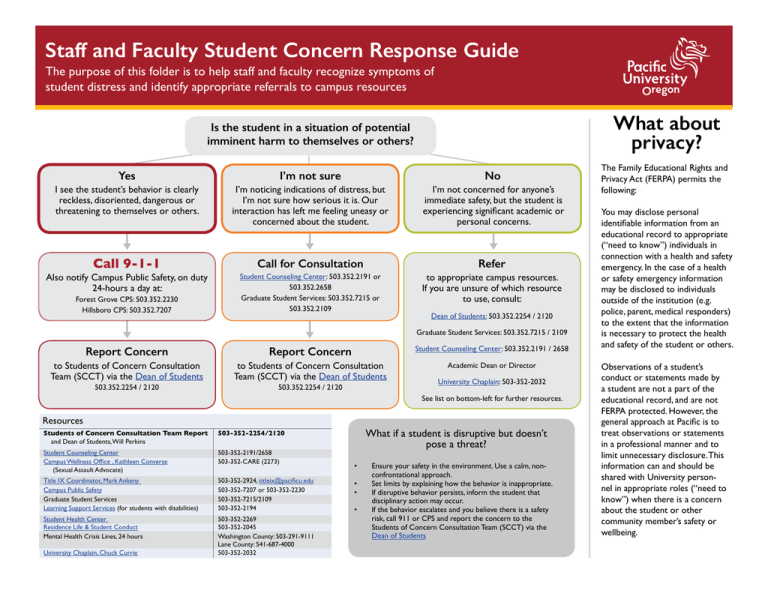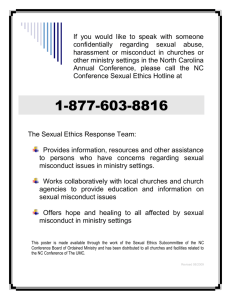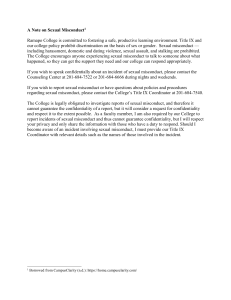
Staff and Faculty Student Concern Response Guide
The purpose of this folder is to help staff and faculty recognize symptoms of
student distress and identify appropriate referrals to campus resources
What about
privacy?
Is the student in a situation of potential
imminent harm to themselves or others?
Yes
I’m not sure
No
I see the student’s behavior is clearly
reckless, disoriented, dangerous or
threatening to themselves or others.
I’m noticing indications of distress, but
I’m not sure how serious it is. Our
interaction has left me feeling uneasy or
concerned about the student.
I’m not concerned for anyone’s
immediate safety, but the student is
experiencing significant academic or
personal concerns.
Call 9-1-1
Also notify Campus Public Safety, on duty
24-hours a day at:
Forest Grove CPS: 503.352.2230
Hillsboro CPS: 503.352.7207
Call for Consultation
Refer
Student Counseling Center: 503.352.2191 or
503.352.2658
Graduate Student Services: 503.352.7215 or
503.352.2109
to appropriate campus resources.
If you are unsure of which resource
to use, consult:
Dean of Students: 503.352.2254 / 2120
Graduate Student Services: 503.352.7215 / 2109
Report Concern
Report Concern
Student Counseling Center: 503.352.2191 / 2658
to Students of Concern Consultation
Team (SCCT) via the Dean of Students
to Students of Concern Consultation
Team (SCCT) via the Dean of Students
Academic Dean or Director
503.352.2254 / 2120
503.352.2254 / 2120
University Chaplain: 503-352-2032
See list on bottom-left for further resources.
Resources
What if a student is disruptive but doesn’t
pose a threat?
Students of Concern Consultation Team Report 503-352-2254/2120
and Dean of Students, Will Perkins
Student Counseling Center503-352-2191/2658
Campus Wellness Office , Kathleen Converse
503-352-CARE (2273)
(Sexual Assault Advocate)
Title IX Coordinator, Mark Ankeny 503-352-2924, titleix@pacificu.edu
Campus Public Safety503-352-7207 or 503-352-2230
Graduate Student Services 503-352-7215/2109
Learning Support Services (for students with disabilities)
503-352-2194
Student Health Center 503-352-2269
Residence Life & Student Conduct503-352-2045
Mental Health Crisis Lines, 24 hours
Washington County: 503-291-9111
Lane County: 541-687-4000
University Chaplain, Chuck Currie503-352-2032
•
•
•
•
Ensure your safety in the environment. Use a calm, nonconfrontational approach.
Set limits by explaining how the behavior is inappropriate.
If disruptive behavior persists, inform the student that
disciplinary action may occur.
If the behavior escalates and you believe there is a safety
risk, call 911 or CPS and report the concern to the
Students of Concern Consultation Team (SCCT) via the
Dean of Students
The Family Educational Rights and
Privacy Act (FERPA) permits the
following:
You may disclose personal
identifiable information from an
educational record to appropriate
(“need to know”) individuals in
connection with a health and safety
emergency. In the case of a health
or safety emergency information
may be disclosed to individuals
outside of the institution (e.g.
police, parent, medical responders)
to the extent that the information
is necessary to protect the health
and safety of the student or others.
Observations of a student’s
conduct or statements made by
a student are not a part of the
educational record, and are not
FERPA protected. However, the
general approach at Pacific is to
treat observations or statements
in a professional manner and to
limit unnecessary disclosure. This
information can and should be
shared with University personnel in appropriate roles (“need to
know”) when there is a concern
about the student or other
community member’s safety or
wellbeing.
Employee Responsibilities Regarding Sexual Misconduct Response
Sexual Misconduct and Sexual Harassment, Stalking, Interpersonal Violence
For relevant policies and behavioral definitions of these behaviors, see:
Title IX’s “Glossary of Terms” and the Student Sexual Misconduct Policy’s “Defining Sexual Misconduct”
Responsible Employees at Pacific
With few limited exceptions, all staff and faculty
are required to promptly report to the
Title IX Coordinator information they have about
possible sexual harassment or sexual misconduct
at Pacific University, including but not limited to sexual
assault, domestic or dating violence, and stalking. This includes
incidents involving students, and employees, and even applies
when misconduct has been perpetuated against or by a third
party. The University has processes in place when to act
promptly and appropriately after it has been put on notice
of sexual misconduct. If you’re unsure whether to report an
incident or concern, consult with the Title IX Coordinator.
A “Responsible Employee” is any Pacific University staff or
faculty member who has the authority to take action to
redress sexual violence, who has been given the duty of
reporting incidents of sexual violence or any other misconduct
by students to the Title IX coordinator or other appropriate
school designee, or whom a student could reasonably believe
has this authority or duty. This definition includes, but is not
limited to, full-time and part-time staff or faculty members,
coaches, club advisors, and clinic supervisors. Student
employees whose duties include the supervision of other
students or responsibility for the welfare of other students,
including Resident Assistants,Voyage and Outdoor Pursuit
leaders, building monitors, and similar positions as explained
during training, are also considered responsible employees. If
you have questions about whether you qualify as a responsible
employee, contact the Title IX Coordinator. Note: While
contracted parties, such as dining services, are not considered
responsible employees, they are highly encouraged to report
misconduct to the University.
By reporting, you are ensuring that victims are connected with those trained to
assist and responsible for responding promptly, ensuring the safety of the victim and
others within our University community, and helping to ensure that the University
meets its obligations in regard to properly responding to these incidents.
Additionally:
• You may report to Campus Public Safety (CPS), especially during evening/weekend hours when
they are more immediately available, though this does not reduce your obligation to report the
incident to the Title IX Coordinator at 503-352-2924 or titleix@pacificu.edu).
• You are not responsible for investigating or asking questions, though you may provide support to
the student or colleague who has approached you.
• You are not required to report information that is presented as a result of a class assignment
(e.g. journal, essay, clinical role play) or that is shared in the context of an educational community
awareness program on sexual violence prevention (e.g. Take Back the Night). However, it is still
a significant opportunity for you to approach the student in a caring way and provide them with
available resources.
• If the incident involves employees, you should also report the incident(s) to Human Resources,
and your supervisor/Department Chair.
Oregon Mandatory Reporting Responsibility
Employees of Oregon public and private higher education institutions are considered by law to be
mandatory reporters of child abuse for minors. If a minor is being hurt or is in danger right now,
call 911 immediately.You must immediately report to the State of Oregon Department of Human
Services (DHS) or law enforcement if you have “reasonable cause to believe” that any child with
whom you come into contact has suffered abuse, or that any person with whom you come into
contact has abused a child. See Pacific’s “Mandatory Reporting” policy for more details.
Sexual Misconduct: Respond, Refer, Report
Sexual Misconduct and Sexual Harassment, Stalking, Interpersonal Violence
For relevant policies and behavioral definitions of these behaviors, see:
Title IX’s “Glossary of Terms” and the Student Sexual Misconduct Policy’s “Defining Sexual Misconduct”
Respond
If someone tells you about experiencing sexual misconduct of any kind, your caring response can help the healing
process.
1. At the earliest possible moment, tell them you are required to report allegations of sexual misconduct to the
Pacific University Title IX Coordinator, Mark Ankeny, at 503-352-2924 or titleix@pacificu.edu. Do not promise
confidentiality.
2. If the person still wants to talk with you:
• Listen. Acknowledge what they are telling you.
•
•
•
•
Reserve any judgment you may feel. Do not make light of the situation.
Do not attempt to investigate or resolve the situation on your own. Instead, ask questions to determine current safety
(“do you feel safe now?”) or offer assistance (“is there anything you need that I could help with?”)
Never tell the complainant to ignore the behavior.
Thank them for sharing with you.
3. Encourage them to reach out directly to Mark Ankeny, Title IX Coordinator (503-352-2924 or titleix@pacificu.edu)
or to a Deputy Title IX Coordinators (see online for updated list) and report the incident. Remind them that you
will be reporting it as well.
Refer
Refer students to speak confidentially with Kathleen Converse, the Campus Wellness Coordinator (503-352-2273).
Refer faculty or staff to Human Resources (503-352-2210) to speak with a professional who can help them understand
their options for seeking support or remedies to the situation.
Report
Report what you know to Mark Ankeny, Title IX Coordinator (503-352-2924 or titleix@pacificu.edu) or to a
Deputy Title IX Coordinator (see online for updated list). Include known names of the involved parties, the status of
the parties (i.e., staff, student, faculty, guest, other), the date of the incident, and location of incident if known. Provide as
much information as you were given, and do not press the person to provide these details.
Do not wait for someone to complain if you know or suspect sexual misconduct is occurring or has occurred.
Community Resources
Washington County, Oregon
Sexual Assault Resource Center
sarcoregon.org
503-640-5311 24 hour crisis line
Domestic Violence Resource Center
www.dvrc-or.org
503-469-8620 or toll free 1-866-4698600
Lane County, Oregon
Sexual Assault Support Services
541-343-7277 24-hour crisis line
Women’s Space
womenspaceinc.org
541-485-6513 24 crisis line
Marion County, Oregon
Mid-Valley Women’s Crisis Service
mvwcs.com
1-866-399-7722 24 hour crisis line
Additional Reources
Staff and Faculty Counseling Services
(Cascade Center EAP)
1-800-433-2320
www.cascadecenter.com
Not Alone (Sexual Violence
Resources)
www.notalone.gov
Help for Survivors
Oregon Sexual Assault Task Force
oregonsatf.org/help-for-survivors/
Recognize, Respond, Refer, Report Reference Guide
Recognize
Something’s wrong, but I’m not exactly sure what that is
•
•
•
•
Disturbing content in papers/e-mails
Decline in academic performance or excessive absenteeism
Irrational or bizarre behavior
Sudden change in demeanor (e.g. an extroverted student withdrawn, an
organized student forgetful, etc.)
Depression, self harm, suicidal risk
•
•
•
•
•
•
Significant changes in appearance, behavior or personal hygiene
Decline in academic performance
Written or verbal statements preoccupied with theme of death or that
convey intent to harm self or others
Fresh cuts, scratches or other wounds
Withdrawal from activities and friends
Statements of hopelessness such as, “What’s the point”, “I hate this life”
or “Everyone is better off without me”
Actual or suspected medical issues (chronic illness, eating disorder, etc.)
•
•
•
•
Frequent or extended absences
Fatigue or dizziness
Noticeable weight loss or gain
Evidently pale or gray skin tone
Alcohol or other drug abuse
•
•
•
•
•
•
Intoxicated/high in class or at meetings/events
Excessive sleepiness or hyper energy
Decline in academic performance
References to alcohol or drug use in conversations, papers, projects, etc.
Deterioration in physical appearance (bloodshot eyes, dilated pupils,
trembling hands, etc.)
Unusual smells on breath, body or clothes
Violence / harassment / sexual assault *see also previous 2 pages
•
•
•
•
•
Appears fearful or unusually anxious about pleasing partner or others
Apologizes/excuses partner/other’s behavior
Mentions partner/other’s possessiveness, jealousy or violent behavior
Injuries/bruises/frequent mishaps; injuries with illogical or no explanations
Crying or leaving room when sexual violence, domestic violence, stalking or
child abuse is the topic
Bullying, harassment, sexual harassment, cyberstalking, interpersonal
violence
•
•
•
•
•
•
Internet flaming, trolling, name-calling or harassment
Communications that continue after being told to stop
Threatening to release private information/photos
Demand for sexual favors by peer or supervisor accompanied by implied or
overt threat concerning an individual’s academic status or employment
Display of sexually suggestive pictures or cartoons in workspace, residence
halls or online
Continued jokes, language, epithets, gestures or remarks of a sexualized
nature
Respond
Refer
•
•
•
•
Express concern and care
Give an example of a time that the student’s behavior has worried you
Listen to and believe student’s responses
Be supportive and encouraging if student agrees to get help
Urgent: 911
•
•
•
•
•
•
Express concern and care
Avoid criticizing, sounding judgmental, minimizing or blaming
Always take suicidal statements, thoughts or behaviors seriously
If you suspect a student may be suicidal, seek immediate consultation
If possible, ask directly about their feelings and plans
Call 911 if there is a threat to student’s safety or the safety of others
Urgent: 911
Advice and consultation:
•
•
•
•
Express concern and care
Avoid criticizing, sounding judgmental, minimizing or blaming
Listen to and believe student’s responses
Recommend (or, if necessary, insist upon) medical intervention
•
•
•
•
•
Express concern or care
Give an example of a time that the student’s behavior has worried you
Listen to and believe student’s responses
Be supportive and encouraging if the student agrees to get help
Offer to help the student make an appointment with BASICS program
for alcohol screening and intervention
Urgent: 911
•
•
•
•
•
•
Express concern and care
Listen to and believe student’s responses
Remain calm. Showing outrage may shut student down
Do not interpret student’s emotions as evidence of assault or violence
Avoid criticizing, sounding judgmental, minimizing or blaming
Say things like, “You’ve been through something very upsetting. I’m so
sorry.”
Urgent: 911
•
•
•
•
Express concern and care
Listen to and believe student’s responses
Avoid criticizing, sounding judgmental, minimizing or blaming
Encourage targeted student to save all digital communications as
downloaded files and/or hard copies
Urgent: 911
Advice and consultation:
Student Counseling Center
503-352-2191
Graduate Student Services
503-352-7215/2109
Student Counseling Center
503-352-2191
Urgent: 911
Advice and consultation:
Student Health Services
503-352-2269
Graduate Student Services
503-352-7215/2109
Advice and consultation:
Student Counseling Center &
BASICS 503-352-2191
Campus Wellness 503-352- 2273
Student Health Center
503-352-2269
Advice and consultation:
Campus Wellness 503-352- 2273
Student Counseling Center
503-352-2191
Student Health Center
503-352-2269
Advice and consultation:
Campus Public Safety
503-352-2230 or 7207
Campus Wellness 503-352- 2273
Report
Dean of Students
503-352-2254/2120
Academic Dean or
Director
Dean of Students
503-352-2254/2120
Campus Public Safety
503-352-2230/7207
Academic Dean or
Director
Dean of Students
503-352-2254/2120
Academic Dean or
Director
Title IX Coordinator
503-352-2924
Also, for Employees:
Human Resources
503-352-2210 and your
Supervisor
Title IX Coordinator
503-352-2924
Also, for Employee:
Human Resources
503-352-2210 and your
Supervisor
For Students:
Dean of Students Office
503-352-2254/2120






